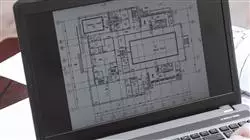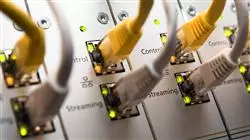University certificate
The world's largest faculty of information technology”
Introduction to the Program
A high-quality program created to shape competent and competitive specialists"

As one of the fastest evolving fields, telecommunications is seeing constant advances. It is therefore necessary to have IT experts who can adapt to these changes and who have first-hand knowledge of the latest tools and techniques.
The Professional master’s degree in Telecommunications Engineering addresses a complete range of topics relating to this field. It has a clear advantage over other Professional Master's Degrees that focus on each topic in isolation, preventing students from learning about the interrelation with other areas comprising the multidisciplinary field of telecommunications. The teaching team on this Professional master’s degree has carefully selected each of the topics of this program to offer the student the most comprehensive academic experience possible, always relating teaching to topical events.
This program is aimed at those interested in attaining expert knowledge of Telecommunications Engineering . The main objective of this Professional master’s degree is for students build expertise in simulated work environments and in rigorous and realistic conditions so that they can then apply it in the real world.
Furthermore, as it is a 100% online program, students are not conditioned by fixed schedules or the need to move to another physical location, but can access the contents at any time of the day, balancing their work or personal life with their academic life.
Don’t miss this opportunity to study this TECH Professional master’s degree in Telecommunications Engineering ” It's the perfect opportunity to advance your career”
This Professional master’s degree in Telecommunications Engineering contains the most complete and up-to-date educational program on the market. The most important features include:
- Case studies presented by experts in Telecommunications Engineering
- Graphic, schematic, and practical contents which provide scientific and practical information on the disciplines that are essential for professional practice
- Practical exercises where self-assessment can be undertaken to improve learning
- A special emphasis on innovative methodologies in of Telecommunications Engineering
- Theoretical lessons, questions to the expert, debate forums on controversial topics, and individual reflection assignments
- Content that is accessible from any fixed or portable device with an Internet connection
A cutting-edge educational program that will allow you to acquire the latest and most innovative knowledge in this professional field"
The teaching staff includes professionals from the field of information and communication technology, who contribute their professional experience to this program, as well as renowned specialists from leading societies and prestigious universities.
Multimedia content, developed with the latest educational technology, will allow professionals to learn in a contextual and situated learning environment, i.e., a simulated environment that will provide immersive learning designed to prepare them for real situations.
The design of this program focuses on Problem-Based Learning, by means of which professionals must try to solve the different professional practice situations that are presented to them throughout the academic program. For this purpose, will be assisted by an innovative interactive video system developed by renowned and experienced experts in Telecommunications Engineering .
This program uses the best teaching material, enabling contextual study that will facilitate learning"

This 100% online program will allow you to combine your studies with your professional work"
Why study at TECH?
TECH is the world’s largest online university. With an impressive catalog of more than 14,000 university programs available in 11 languages, it is positioned as a leader in employability, with a 99% job placement rate. In addition, it relies on an enormous faculty of more than 6,000 professors of the highest international renown.

Study at the world's largest online university and guarantee your professional success. The future starts at TECH”
The world’s best online university according to FORBES
The prestigious Forbes magazine, specialized in business and finance, has highlighted TECH as “the world's best online university” This is what they have recently stated in an article in their digital edition in which they echo the success story of this institution, “thanks to the academic offer it provides, the selection of its teaching staff, and an innovative learning method aimed at educating the professionals of the future”
A revolutionary study method, a cutting-edge faculty and a practical focus: the key to TECH's success.
The most complete study plans on the university scene
TECH offers the most complete study plans on the university scene, with syllabuses that cover fundamental concepts and, at the same time, the main scientific advances in their specific scientific areas. In addition, these programs are continuously being updated to guarantee students the academic vanguard and the most in-demand professional skills. In this way, the university's qualifications provide its graduates with a significant advantage to propel their careers to success.
TECH offers the most comprehensive and intensive study plans on the current university scene.
A world-class teaching staff
TECH's teaching staff is made up of more than 6,000 professors with the highest international recognition. Professors, researchers and top executives of multinational companies, including Isaiah Covington, performance coach of the Boston Celtics; Magda Romanska, principal investigator at Harvard MetaLAB; Ignacio Wistumba, chairman of the department of translational molecular pathology at MD Anderson Cancer Center; and D.W. Pine, creative director of TIME magazine, among others.
Internationally renowned experts, specialized in different branches of Health, Technology, Communication and Business, form part of the TECH faculty.
A unique learning method
TECH is the first university to use Relearning in all its programs. It is the best online learning methodology, accredited with international teaching quality certifications, provided by prestigious educational agencies. In addition, this disruptive educational model is complemented with the “Case Method”, thereby setting up a unique online teaching strategy. Innovative teaching resources are also implemented, including detailed videos, infographics and interactive summaries.
TECH combines Relearning and the Case Method in all its university programs to guarantee excellent theoretical and practical learning, studying whenever and wherever you want.
The world's largest online university
TECH is the world’s largest online university. We are the largest educational institution, with the best and widest online educational catalog, one hundred percent online and covering the vast majority of areas of knowledge. We offer a large selection of our own degrees and accredited online undergraduate and postgraduate degrees. In total, more than 14,000 university degrees, in eleven different languages, make us the largest educational largest in the world.
TECH has the world's most extensive catalog of academic and official programs, available in more than 11 languages.
Google Premier Partner
The American technology giant has awarded TECH the Google Google Premier Partner badge. This award, which is only available to 3% of the world's companies, highlights the efficient, flexible and tailored experience that this university provides to students. The recognition as a Google Premier Partner not only accredits the maximum rigor, performance and investment in TECH's digital infrastructures, but also places this university as one of the world's leading technology companies.
Google has positioned TECH in the top 3% of the world's most important technology companies by awarding it its Google Premier Partner badge.
The official online university of the NBA
TECH is the official online university of the NBA. Thanks to our agreement with the biggest league in basketball, we offer our students exclusive university programs, as well as a wide variety of educational resources focused on the business of the league and other areas of the sports industry. Each program is made up of a uniquely designed syllabus and features exceptional guest hosts: professionals with a distinguished sports background who will offer their expertise on the most relevant topics.
TECH has been selected by the NBA, the world's top basketball league, as its official online university.
The top-rated university by its students
Students have positioned TECH as the world's top-rated university on the main review websites, with a highest rating of 4.9 out of 5, obtained from more than 1,000 reviews. These results consolidate TECH as the benchmark university institution at an international level, reflecting the excellence and positive impact of its educational model.” reflecting the excellence and positive impact of its educational model.”
TECH is the world’s top-rated university by its students.
Leaders in employability
TECH has managed to become the leading university in employability. 99% of its students obtain jobs in the academic field they have studied, within one year of completing any of the university's programs. A similar number achieve immediate career enhancement. All this thanks to a study methodology that bases its effectiveness on the acquisition of practical skills, which are absolutely necessary for professional development.
99% of TECH graduates find a job within a year of completing their studies.
Professional Master's Degree in Telecommunication Engineering
.
Telecommunications engineering addresses different fields, from the design and development of services to multimedia and broadband communication applications, as a result of this and the constant evolution in the field, engineers every day are in search of new knowledge to enhance their skills and take their careers to the next level. At TECH we have a Professional Master's Degree in Telecommunication Engineering, a highly qualified specialization that will allow you to reinforce all your knowledge to become an expert. This program is designed to provide comprehensive learning and promote the development of network designs and installations; also, you will be able to learn in depth about analog and digital electronics, switching networks, telecommunications infrastructure and electronics and instrumentation. While you learn you will be able to train with the best online teaching tools and have the continuous support of professionals in the sector.
Get a Professional Master's Degree and be an expert in telecommunications engineering
.
At TECH we have the largest Faculty of Computer Science in the world, we provide you with an exceptional methodology that will allow you to acquire the necessary knowledge to develop your skills and acquire new intellect in topics such as efficient communication systems, radio services, mobile communications networks, random signals and advanced linear systems in technology. Throughout 1,500 hours of completely online teaching, you will be able to specialize in a unique program, which will allow you to adapt to constant changes and learn about the most up-to-date tools and/or techniques. In addition, you will be able to carry out case studies designed and tested by expert engineers, as well as participate in forums to exchange information and create learning relationships. In this way, you will be able to complement your education with theoretical lessons and reflective work. If you want to achieve a level of prestige and recognition in this field, take this Professional Master's Degree that will help you improve your resume and increase your job opportunities by 99%.







